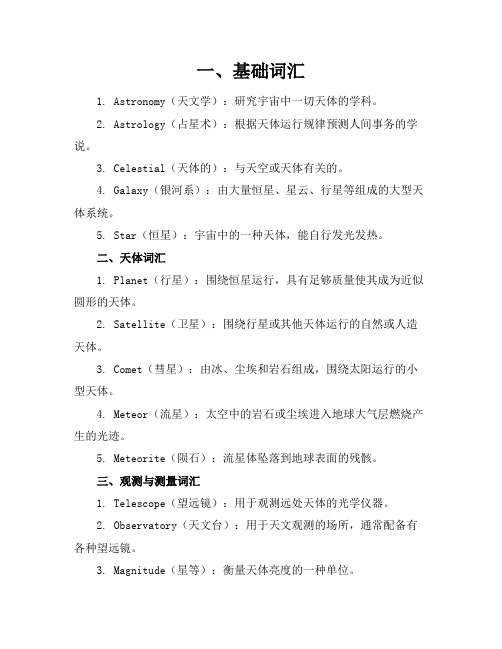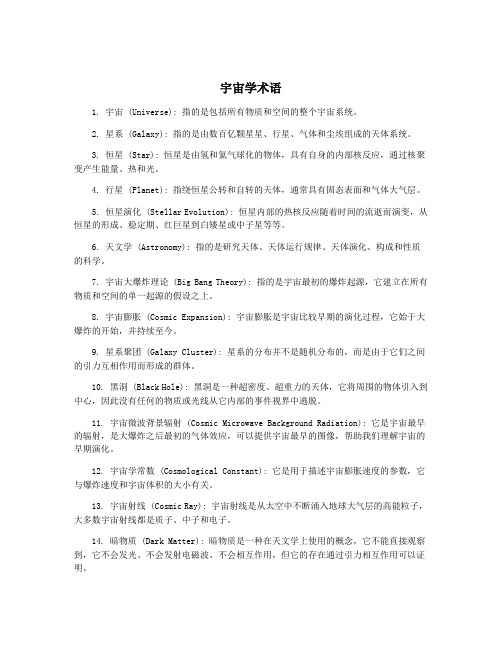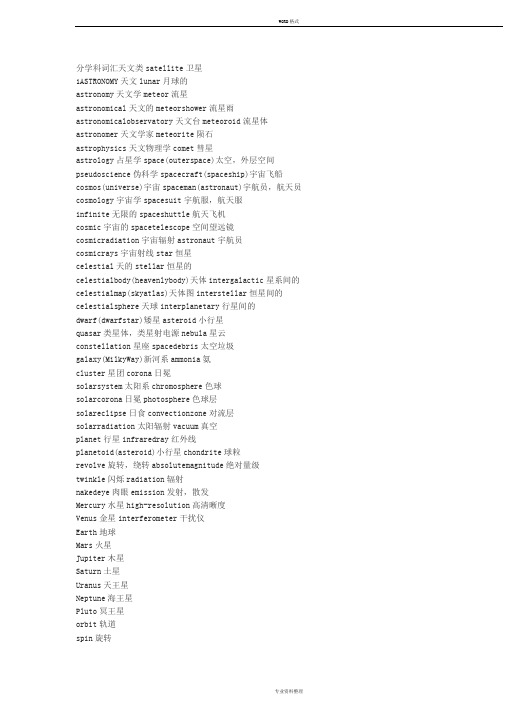§宇宙相关英语词汇§
关于宇宙的英文单词

关于宇宙的英文单词English Answer:Universe.The universe is the totality of everything that exists, including all of space and time. It is the sum of all matter and energy, and the sum of all natural laws. The universe is vast and old, and it is constantly expanding.The universe is thought to have begun about 13.8billion years ago with the Big Bang. The Big Bang was a cataclysmic event that created all of the matter and energy in the universe. In the first few moments after the Big Bang, the universe was very hot and dense. As it cooled and expanded, it began to form atoms and molecules. These atoms and molecules eventually formed stars and galaxies.The universe is made up of about 70% dark energy, 25% dark matter, and 5% ordinary matter. Dark energy is amysterious force that is causing the universe to expand at an accelerating rate. Dark matter is a type of matter that does not interact with light or other electromagnetic radiation. Ordinary matter is the type of matter that we are familiar with, such as the matter that makes up our bodies and the Earth.The universe is home to billions of galaxies. Galaxies are vast collections of stars, gas, and dust. The Milky Way is the galaxy that our solar system is located in. The Milky Way is a spiral galaxy with about 100 billion stars.The universe is a vast and mysterious place. We are only beginning to understand its true nature. As we continue to explore the universe, we will learn more about its origins, its evolution, and its ultimate fate.Chinese Answer:宇宙。
高考英语一轮复习话题14宇宙知识(Unit4Astronomythescienceofthestars)新人教版必修3

话题14 宇宙知识(Unit 4 Astronomy the science of the stars)晨读背诵1. get started开始2. grasp/seize the opportunity 抓住机会3. set foot in China踏上中国的土地4. as sb. puts it正如某人所说5. enjoy a boom in scientific and technological development有科技发展的兴隆6. send satellites into space发射卫星到太空7. first manned space flight首次载人太空飞行8. deadly disease致命的疾病 9. to name (just) a few仅以这些为例10. name after the atest technology of the time以那个时期最新的技术为名11. give rise to引起 12. in some/most cases在某些/大多数情况下13. the same is true for ……也适用于 14. run a company经营公司15. aim at sth./doing以做……为目的16. for the time being 暂时基础知识自测一、单词拓展(A)根据音标及词义写出英文单词。1. astronomy [əˈstrɒnəmɪ] n.天文学→astronomer [əˈstrɒnəmə(r)] n.天文学家2. system [ˈsɪstəm] n.系统;体系;制度3. theory [ˈθɪərɪ] n.学说;理论→theoretical [θɪəˈretɪk(ə)l] adj.理论上的4. globe [ɡləʊb] n.球体;地球仪;地球→global [ˈɡləʊb(ə)l] adj.全球性的;全世界的5. violent [ˈvaɪələnt] adj.猛烈的;激烈的;强暴的→violence [ˈvaɪələns] n.暴力→violently [ˈvaɪələntlɪ]adv.猛烈地6. atmosphere [ˈætməsfɪə(r)] n.大气层;气氛7. unlike [ʌnˈlaɪk] prep.不同;不像→dislike [dɪsˈlaɪk] vt.不喜欢8. presence [ˈprezəns] n.出席;到场;存在→present [ˈprez(ə)nt] adj. & n. & v.在场的;目前,现在;出席;颁发,授予9. harmful ['hɑ:mful] adj.有害的;伤害的→harm [hɑːm] n.危害,害处→harmless [ˈhɑːmlɪs] adj.无害的10. exist [ɪɡˈzɪst] vi.存在,生存→existence [ɪɡˈzɪst(ə)ns] n.存在,生存11. puzzle [ˈpʌz(ə)l] n.谜;难题vt. & vi.(使)迷惑;(使)为难→puzzled [ˈpʌz(ə)ld]adj.迷惑的→puzzling [ˈpʌz(ə)lɪŋ]adj.令人迷惑的12. gravity [ˈɡrævɪtɪ] n.万有引力;重力13. satellite [ˈsætəlaɪt] n.卫星;人造卫星14. climate [ˈklaɪmɪt] n.气候15. spaceship [ˈspeɪsʃɪp] n.宇宙飞船16. pull [pʊl] n. & vt.拉(力);拖;牵引力17. float [fləʊt] vi. & vt.(使)浮动;(使)漂浮 n.漂浮物18. mass [mæs] n.质量;团;块;大量;(复)群众(B)单词活用用所给词的正确形式填空。
天文类专业英语词汇

一、基础词汇1. Astronomy(天文学):研究宇宙中一切天体的学科。
2. Astrology(占星术):根据天体运行规律预测人间事务的学说。
3. Celestial(天体的):与天空或天体有关的。
4. Galaxy(银河系):由大量恒星、星云、行星等组成的大型天体系统。
5. Star(恒星):宇宙中的一种天体,能自行发光发热。
二、天体词汇1. Planet(行星):围绕恒星运行,具有足够质量使其成为近似圆形的天体。
2. Satellite(卫星):围绕行星或其他天体运行的自然或人造天体。
3. Comet(彗星):由冰、尘埃和岩石组成,围绕太阳运行的小型天体。
4. Meteor(流星):太空中的岩石或尘埃进入地球大气层燃烧产生的光迹。
5. Meteorite(陨石):流星体坠落到地球表面的残骸。
三、观测与测量词汇1. Telescope(望远镜):用于观测远处天体的光学仪器。
2. Observatory(天文台):用于天文观测的场所,通常配备有各种望远镜。
3. Magnitude(星等):衡量天体亮度的一种单位。
4. Parsec(秒差距):用于测量天体距离的单位,相当于3.26光年。
5. Lightyear(光年):光在一年内行进的距离,用于描述天体间的距离。
四、天体物理词汇1. Black hole(黑洞):引力强大到连光都无法逃逸的天体。
2. Supernova(超新星):恒星在生命终结时发生的一种爆炸现象。
3. Nebula(星云):由气体和尘埃组成的星际物质云。
4. Quasar(类星体):一种极为遥远、亮度极高的天体,被认为是活动星系的核心。
5. Redshift(红移):天体光谱向红色端偏移的现象,通常用于测量天体的距离。
五、宇宙结构与演化词汇1. Universe(宇宙):包含一切物质、能量、空间和时间的整体。
2. Cosmic microwave background(宇宙微波背景辐射):大爆炸后残留下来的热辐射,是宇宙早期的证据。
子主题21 地球与宇宙探秘,+航天事业发展+知识清单 中考英语人教版一轮复习词汇背记

子主题21地球与宇宙探秘,航天事业发展名词1.*astronaut/'æstrənɔːt/n.宇航员;航天员2.earth/ɜː(r)θ/n.地球;大地;土;世界3.*gas/ɡæs/ n.气体燃料;气体4.ground/graʊnd/n.地面;地5.hole/həʊl/n.洞;坑;孔6.moon/muːn/n.月亮;月球7.planet/'plænIt/n.行星8.space/speIs/n.空间;太空;空地9.surface/'sɜː(r)fIs/n.表面;表层10.*universe/'juːnIvɜː(r)s/n.宇宙11.world/wɜː(r)ld/n.世界;地球动词12.*belong/bI'lɒŋ;bI'lɔːŋ/v.属于;归属兼类词13.empty/'empti/adj.空的;空洞的v.倒空;(河流)流入,注入nd/lænd/n.陆地;土地;大地v.登岸(陆);降落【一词多义】其他名词1.bit/bIt/n.一点;小块;少量2.example/Ig'zɑːmpl/,/Ig'zæmpl/ n.实例;范例;样品3.*moment/'məʊmənt/ n.片刻;瞬间4.*percent/pə(r)'sent/(=per cent)n.百分之……5.piece/piːs/n.一块(片、张、件……);块;段6.unit/'juːnIt/n.单元;单位;机件动词7.be/biː,bi/ v.在;是;存在8.could/kəd;kʊd/modal v.(can的过去式)能;可以9.do/duː;də/ aux v.& v.用于构成否定句和疑问句;做;干10.have/hæv;həv/(has/hæz;həz/)v.有;吃;喝;经历;经受11.may/meI/modal v.可以;可能→might/maIt/ (过去式)12.must/mʌst/ modal v.必须13.shall/ʃæl,ʃəl/ modal v.将要;将会;……好吗;要不要……14.should/ʃəd;ʃʊd/modal v.应该;应当;可以形容词15.every/'evri/ adj.每一;每个16.everyday/'evrideI/adj.每天的;日常的;每日的17.impossible/Im'pɒsəbl/,/Im'pɑːsəbl/adj.不可能存在或发生的;不可能的18.sudden/'sʌdən/ adj.突然的;忽然的19.tiny/'taIni/adj.极小的;微小的副词20.*actually/'æktʃuəli/ ad v.真实地;事实上21.again/ə'ɡen/ad v.再一次;又一次22.*ahead/ə'hed/ad v.(时间、空间)向前面;在前面23.almost/'ɔːlməʊst/ad v.几乎;差不多24.already/ɔːl'redi/ad v.已经;早已25.also/'ɔːlsəʊ/ad v.也;而且26.always/'ɔːlweIz/ ad v.总是;一直【拓展】常见的频度副词及其频率高低27.anyway/'eniweI/ad v.而且;加之;尽管;即使这样;无论如何28.anywhere /'eniweə(r)/ ad v .在任何地方【拓展】由where 构成的不定副词 where —⎪⎪⎪⎪—somewhere ad v .在某处,常用在肯定句中—anywhere ad v .在任何地方—nowhere ad v .任何地方都不,相当于not …anywhere —everywhere ad v .到处;处处,相当于here and there29.away /ə'weI/ ad v .离开;远离30.else /els/ ad v .别的;其他的31.especially /I'spe ʃəli/ ad v .尤其;特别;格外32.even /'i ːvn/ ad v .甚至;连;愈加;即使33.ever /'evə(r)/ ad v .在任何时候;从来;曾经34.everywhere /'evriweə(r)/ ad v .处处;到处;各个地方35.exactly /I ɡ'zæktli/ ad v .确切地;精确地36.hardly /'h ɑːdli/ ad v .几乎不;几乎没有37.here /hIə(r)/ ad v .(用以介绍某人或某物)这就是;在这里38.however /ha ʊ'evə(r)/ ad v .然而;不过;不管怎样39.instead /In'sted/ ad v .代替;反而;却40.just /d ʒʌst/ ad v .只是;恰好;仅仅;刚才41.nearly /'nIəli/ ad v .几乎,将近42.never /'nevə(r)/ ad v .从不;绝不43.not /n ɒt ;n ɑːt/ ad v .不;没有;不是44.often /'ɒfn/,/'ɔːfn/ ad v .时常;常常45.*rather /' r ɑːðə/ ad v .宁愿;相当46.sometimes /'s ʌmtaImz/ ad v .有时47.somewhere /'s ʌmweə(r)/ ad v .在某处;到某处48.soon /su ːn/ ad v .不久;很快;马上49.still /stIl/ ad v .还;仍然;还是50.then /ðen/ ad v .那么;当时;那时;然后51.there /ðeə(r);ðer/ ad v .(在)那里;到那里52.*therefore /'ðeəf ɔː(r);'ðerf ɔːr/ ad v .因此;所以;因而53.too /tu ː/ ad v .也;又;太54.up /ʌp/ ad v .向上;(尤指异常或不愉快的事)发生55.very /'veri/ ad v .很;非常56.why /waI/ ad v .为什么57.yet /jet/ ad v .(常用于否定句或疑问句)还;仍然58.where /weə(r);wer/ ad v .在哪里;到哪里介 词59.against /ə'genst/ prep .对着;反对【一词多义】倚靠违反反对对抗60.among/ə'mʌŋ/prep.在(其)中;……之一61.at/æt;ət/prep.(提供电话号码等时使用)按照;根据;在(某处、某时间或时刻)62.beside/bI'saId/prep.在……旁边;在……附近63.between/bI'twiːn/prep.在(两者)之间;介于……之间64.during/'djʊərIŋ/prep.在……期间65.for/fɔː(r);fə(r)/prep.为了;(表示对象、用途等)给;因为……;对;对于……;(表示去向)往66.from/frɒm;frəm/prep.(表示开始的时间)从……开始;来自;从……来;从……出发67.into/'Intuː;'Intə/prep.到……里面;进入68. of/ɒv;əv/,/ʌv;əv/prep.属于(某人或某物);关于(某人或某物);(表示所属、数量、其中)……的69.on/ɒn/,/ɑːn/ prep.在……上;关于70.through/θruː/prep.以;凭借;穿过;贯穿71.to/tuː;tə/ prep.到,对,向;……之前(动词不定式符号,无词义)72.towards/tə'wɔːdz/prep.朝;向;对着73.under/'ʌndə(r)/prep.在……下(物体之间不接触)74.upon/ə'pɒn/prep.在……上面;近在咫尺;即将来临连词75.although/ɔːl'ðəʊ/ conj.虽然;尽管;即使76.and/ænd;ənd/conj.和;又;而77.because/bI'kɒz;bI'kɔːz/conj.因为【辨析】because of与because考点词性含义用法because of介词短语因为后接名词、代词、动名词或what从句等引导原因状语从句,表示直接、明确的原because连词因为因或理由79.unless/ən'les/conj.除非;如果不;除非在……情况下80.whenever/wen'evə(r)/conj.在任何……的时候;无论何时81.whether/'weðə(r)/conj.不管……(还是);或者……(或者);是否代词82.anybody/'enibɒdi/pron.任何人;无论谁83.anything/'eniθIŋ/pron.(常用于否定句和疑问句)任何东西;任何事物84.everybody/'evri'bɒdi/pron.每人;人人;所有人85.everything/'evriθIŋ/pron.所有事物;一切86.he/hiː;hi/pron.他→him/hIm/pron.(宾格)他→his/hIz/pron.他的→himself/hIm'self/pron.他自己87.plenty/'plenti/pron.大量;众多;充足;丰富88.she/ʃiː;ʃi/pron.她→her/hɜː(r);hə(r)/pron.(宾格)她;(形容词性物主代词)她的→hers/hɜː(r)z/pron.(名词性物主代词)她的→herself/hɜː(r)'self/pron.她自己89.I/aI/pron.(主格)我→me/miː;mI/pron.(宾格)我→my/maI/pron.(形容词性物主代词)我的→mine/maIn/pron.(名词性物主代词)我的→myself/maI'self/pron.我自己;我本人90.it/It/pron.它→its/Its/pron.它的→itself/It'self/pron.它自己91.we/wiː;wi/pron.我们→us/ʌs;əs/pron.(宾格)我们→our/ɑː(r);'aʊə(r)/pron.(形容词性物主代词)我们的→ours/aː(r)z/;/'aʊə(r)z/pron.(名词性物主代词)我们的→ourselves/ˌaʊə(r)'selvz/pron.我们自己92.they/ðeI/pron.(主格)他(她、它)们→them/ðem;ðəm/pron.(宾格)他(她、它)们→their/ðeə(r)/pron.(形容词性物主代词)他(她、它)们的→*theirs/ðeəz/pron.(名词性物主代词)他(她、它)们的→themselves/ðəm'selvz/pron.他(她、它)们自己93.you/juː;ju/pron.你;您;你们→your/jɔː(r)/pron.(形容词性物主代词)你的;你们的→yours/jɔː(r)z/pron.(名词性物主代词)你的;你们的→yourself/jɔː(r)'self/ pron.(pl.yourselves)你自己;您自己94.none/nʌn/pron.没有一个;毫无95.nothing/'nʌθIŋ/pron.没有什么;没有一件东西;无关紧要的东西96.someone/'sʌmwʌn/ pron.某人97.something/'sʌmθIŋ/pron.某事;某物98.these/ðiːz/pron.这些99.whatever/wɒt'evə(r)/pron.任何;每一;无论什么;不管什么;任何(每样)事物【拓展】疑问词+ever=no matter+疑问词,意为“不管/不论+该疑问词的本意”,此类单词有:whatever,whichever,whoever,wherever,whenever,however。
宇宙学术语

宇宙学术语1. 宇宙 (Universe): 指的是包括所有物质和空间的整个宇宙系统。
2. 星系 (Galaxy): 指的是由数百亿颗星星、行星、气体和尘埃组成的天体系统。
3. 恒星 (Star): 恒星是由氢和氦气球化的物体,具有自身的内部核反应,通过核聚变产生能量、热和光。
4. 行星 (Planet): 指绕恒星公转和自转的天体,通常具有固态表面和气体大气层。
5. 恒星演化 (Stellar Evolution): 恒星内部的热核反应随着时间的流逝而演变,从恒星的形成、稳定期、红巨星到白矮星或中子星等等。
6. 天文学 (Astronomy): 指的是研究天体、天体运行规律、天体演化、构成和性质的科学。
7. 宇宙大爆炸理论 (Big Bang Theory): 指的是宇宙最初的爆炸起源,它建立在所有物质和空间的单一起源的假设之上。
8. 宇宙膨胀 (Cosmic Expansion): 宇宙膨胀是宇宙比较早期的演化过程,它始于大爆炸的开始,并持续至今。
9. 星系聚团 (Galaxy Cluster): 星系的分布并不是随机分布的,而是由于它们之间的引力互相作用而形成的群体。
10. 黑洞 (Black Hole): 黑洞是一种超密度、超重力的天体,它将周围的物体引入到中心,因此没有任何的物质或光线从它内部的事件视界中逃脱。
11. 宇宙微波背景辐射 (Cosmic Microwave Background Radiation): 它是宇宙最早的辐射,是大爆炸之后最初的气体效应,可以提供宇宙最早的图像,帮助我们理解宇宙的早期演化。
12. 宇宙学常数 (Cosmological Constant): 它是用于描述宇宙膨胀速度的参数,它与爆炸速度和宇宙体积的大小有关。
13. 宇宙射线 (Cosmic Ray): 宇宙射线是从太空中不断涌入地球大气层的高能粒子,大多数宇宙射线都是质子、中子和电子。
14. 暗物质 (Dark Matter): 暗物质是一种在天文学上使用的概念,它不能直接观察到,它不会发光、不会发射电磁波、不会相互作用,但它的存在通过引力相互作用可以证明。
关于宇宙的词汇英文

关于宇宙的词汇英文English:The universe is a vast expanse containing everything that exists, from stars and galaxies to planets, moons, and even the smallest particles. At its largest scales, the universe is governed by the laws of physics, including gravity, electromagnetism, and the strong and weak nuclear forces. Within the universe, there are various structures, such as galaxy clusters, superclusters, and cosmic voids, which are shaped by gravitational interactions over billions of years. The universe is also characterized by its expansion, as evidenced by the observation of distant galaxies moving away from us, indicating that space itself is stretching. This expansion has been unfolding since the Big Bang, the event marking the beginning of the universe's current form around billion years ago. Throughout its history, the universe has undergone various stages of evolution, from the formation of the first atoms to the emergence of galaxies and the eventual development of life on Earth. As humans continue to explore the cosmos, we uncover new phenomena and deepen our understanding of the universe's vast complexity.中文翻译:宇宙是一个广阔的空间,包含着从恒星和星系到行星、卫星,甚至是最微小的粒子等一切存在物。
天文类专业英语词汇

WORD格式分学科词汇天文类satellite卫星1ASTRONOMY天文lunar月球的astronomy天文学meteor流星astronomical天文的meteorshower流星雨astronomicalobservatory天文台meteoroid流星体astronomer天文学家meteorite陨石astrophysics天文物理学comet彗星astrology占星学space(outerspace)太空,外层空间pseudoscience伪科学spacecraft(spaceship)宇宙飞船cosmos(universe)宇宙spaceman(astronaut)宇航员,航天员cosmology宇宙学spacesuit宇航服,航天服infinite无限的spaceshuttle航天飞机cosmic宇宙的spacetelescope空间望远镜cosmicradiation宇宙辐射astronaut宇航员cosmicrays宇宙射线star恒星celestial天的stellar恒星的celestialbody(heavenlybody)天体intergalactic星系间的celestialmap(skyatlas)天体图interstellar恒星间的celestialsphere天球interplanetary行星间的dwarf(dwarfstar)矮星asteroid小行星quasar类星体,类星射电源nebula星云constellation星座spacedebris太空垃圾galaxy(MilkyWay)新河系ammonia氨cluster星团corona日冕solarsystem太阳系chromosphere色球solarcorona日冕photosphere色球层solareclipse日食convectionzone对流层solarradiation太阳辐射vacuum真空planet行星infraredray红外线planetoid(asteroid)小行星chondrite球粒revolve旋转,绕转absolutemagnitude绝对量级twinkle闪烁radiation辐射nakedeye肉眼emission发射,散发Mercury水星high-resolution高清晰度Venus金星interferometer干扰仪Earth地球Mars火星Jupiter木星Saturn土星Uranus天王星Neptune海王星Pluto冥王星orbit轨道spin旋转专业资料整理。
太空英语单词

太空相关的英语单词1.Astronaut (宇航员): A person trained to travel or work in outerspace.Example: Astronauts undergo rigorous training before embarking on space missions.2.Galaxy (星系): A system of millions or billions of stars, along withgas and dust, held together by gravitational attraction.Example: Our solar system is just one small part of the Milky Way galaxy.3.Cosmic (宇宙的): Relating to the universe, especially as distinctfrom Earth.Example: Cosmic rays are high-energy particles from space that can impact our atmosphere.4.Spacesuit (太空服): A garment designed to protect astronautsfrom the harsh conditions of space.Example: Astronauts wear spacesuits during spacewalks to stay safe in the vacuum of space.5.Orbit (轨道): The path of an object around a celestial body, suchas a planet or star.Example: Satellites orbit the Earth to collect data and provide communication services.6.Meteoroid (流星体): A small rocky or metallic body in outerspace.Example: When a meteoroid enters the Earth's atmosphere, it becomes a meteor.7.Exoplanet (外行星): A planet that orbits a star outside our solarsystem.Example: Scientists use telescopes to discover and study exoplanets in distant star systems.8.Nebula (星云): A vast cloud of gas and dust in space, where starsare often formed.Example: The Eagle Nebula is a well-known region of active star formation.9.Gravity (重力): The force that attracts two masses toward eachother.Example: Gravity is what keeps planets in orbit around the Sun. 10.Black Hole (黑洞): A region in space where gravity is so strongthat nothing, not even light, can escape.Example: Scientists study the effects of black holes on nearby stars and gas.11.Spacecraft (航天器): A vehicle designed for travel or operation inouter space.Example: The V oyager spacecraft explored the outer planets of oursolar system.12.Telescope (望远镜): An optical instrument that gathers andmagnifies distant light.Example: Astronomers use telescopes to observe celestial objects in the night sky.13.Rocket (火箭): A vehicle that uses controlled explosions ofpropellant to propel itself into space.Example: Rockets are essential for launching satellites and conducting space exploration.14.Lunar (月球的): Relating to the Moon.Example: The Apollo missions aimed to explore the lunar surface and conduct experiments.15.Cosmonaut (宇航员): A Russian astronaut or space traveler.Example: Yuri Gagarin was the first cosmonaut to orbit the Earth in 1961.16.Satellite (卫星): An object that orbits a celestial body, such as aplanet or moon.Example: Communication satellites play a crucial role in global telecommunications.17.Microgravity (微重力): A condition in which objects appear to beweightless and experience very small accelerations.Example: Scientists conduct experiments in microgravity aboard theInternational Space Station.18.Astrophysics (天体物理学): The branch of astronomy that dealswith the physical properties and behavior of celestial objects.Example: Astrophysicists study the origin and evolution of stars and galaxies.19.Spacewalk (太空行走): An activity in which an astronaut floats inspace outside a spacecraft.Example: Astronauts perform spacewalks to repair and maintain equipment on the International Space Station.20.Hubble (哈勃望远镜): The Hubble Space Telescope, a powerfultelescope in orbit around Earth.Example: The Hubble telescope has provided stunning images and valuable data about distant galaxies.。
- 1、下载文档前请自行甄别文档内容的完整性,平台不提供额外的编辑、内容补充、找答案等附加服务。
- 2、"仅部分预览"的文档,不可在线预览部分如存在完整性等问题,可反馈申请退款(可完整预览的文档不适用该条件!)。
- 3、如文档侵犯您的权益,请联系客服反馈,我们会尽快为您处理(人工客服工作时间:9:00-18:30)。
§宇宙相关英语词汇§
world 世界
orb 星球,天体
cosmos 宇宙cosmography 宇宙结构学cosmogony 宇宙起源学cosmology 宇宙论
earth 地球
sphere 天体,球面
globe 球
space 空间
sky 天
vault of heaven, celestial v ault 天穹
heavenly body 天体
planet 行星
planetary 行星的interplanetary 生星际的
star 星
morning star 晨星
evening star 昏星
shooting star 流星polestar 北极星
comet 彗星
tail 彗尾
asteroid 小行星
aerolite 陨石
satellite 卫星
constellation 星座
nebula 星云
galaxy 银河
ring of Saturn 土星环
Milky Way 银河
orbit 轨道
apsis 拱点equator 赤道
zenith 天顶
epicycle 本轮
apogee 远地点
perigee 近地点
node 交点
limb 边缘
solar system 太阳系
sun 太阳
photosphere 光球
chromosphere 色球
solar corona 日冕
halo 晕
aureole 光环
macula 黑子
to rise (日)出
sunrise 日出
dawn, daybreak 黎明
to shine 照耀
to set (日)落
sunset 日落
nightfall, dusk 黄昏
rainbow 彩虹
sun's rays 太阳光
eclipse 食
solstice 至日,至点
winter solstice 冬至
summer solstice 夏至
equinox 二分点
moon 月球
cusp of the moon 月牙的尖
角
lunation 朔望月
phase 月相
selenography 月面学
full moon 满月
new moon 新月
first quarter moon 半月,上弦
月
waxing moon, crescent moo
n 娥眉月,盈月
half-moon 半月
last quarter moon 半月,下弦
月
waning moon 娥眉月,亏月
Great Bear, Ursa Major 大熊
(星)座
Little Bear, Ursa Minor 小熊
(星)座
Greater Dog 大犬(星)座
Lesser Dog 小犬(星)座
Bootes 牧夫(星)座
Wagoner, Waggoner 御夫(星)
座
signs of the zodiac 黄道十二
宫
Aries 白羊宫,白羊(星)座
Taurus 金牛宫,金牛(星)座
Gemini 双子宫,双子(星)座
Cancer 巨蟹宫,巨蟹(星)座
Leo 狮子宫,狮子(星)座
Virgo 室女宫,室女(星)座
Libra 天秤宫,天秤(星)座
Scorpio 天蝎宫,天蝎(星)座
Sagittarius 人马宫,人马(星)座
Capricorn 摩羯宫,摩羯(星)座
Aquarius 宝瓶宫,宝瓶(星)座
Pisces 双鱼宫,双鱼(星)座
23。
